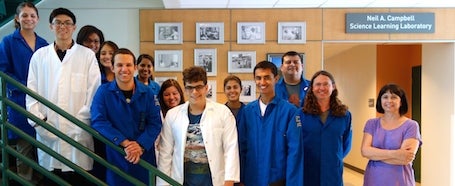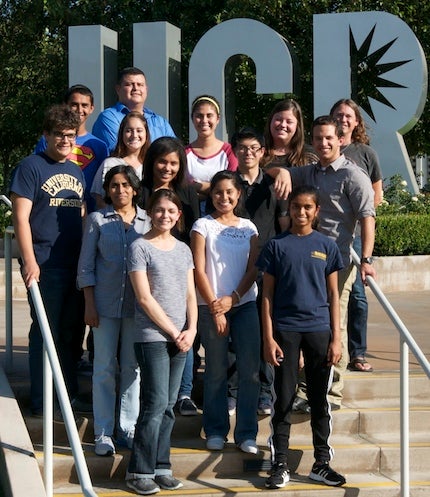Summer Research Opportunity for UCR Students
The USDA awarded a grant to Dr Susan Wessler, Dr. Jim Burnette, and Dr. Mikael Roose to host a research institute in the Campbell Lab. Eight to ten students will be selected each summer to participate in characterizing the genome of the Citrus tree especially focusing on transposable elements. The DG Scholars will use a combination of computational and molecular biology to identify and clone elements for activity assays.
Students will also attend a one-week workshop at Keck Graduate Institute to study agribusiness focusing on issues in food sustainability. With guidance from KGI faculty and graduate students, the DG Scholars will investigate the role of genetically engineered crops in the future of agriculture.
The 2015 USDA-HSI DG Summer Scholars
This summer the 13 Scholars were joined by 11 HHMI SALSA Scholars and all worked in the Campbell Laboratory for nine weeks. During that time the genotyped seedlings from Fairchild Mandarin and identified potentially active transposable elements. Students got to the cloning stage for 20 of the 22 elements identified.
Students also investigated using CRISPR technology to propose a solution to a food security issue. They attended a three day workshop at the Keck Graduate Institute to learn about risk assessment, IP issues, and marketing. They presented their ideas and finding during an oral presentation that concluded with a recommendation as to whether the project was viable.
The 2014 USDA-HSI DG Summer Scholars
Press Enterprise Newspaper Article
Students (L-R): Alyssa Rodriguez, Steven Li, Zoe Figueroa, Leslie Banuelos, Travis Wrightsman, Leslie Aranda, Jenna Roper, Cameron Hatch, Katherine Espinoza, Shivam Patel. Faculty (L-R): Alex Cortez, Jim Burnette, Sue Wessler.
Summer 2014 Summary
The 2014 summer program ran for eight weeks with two themes: basic research on the citrus genome and applied research on genetically modified organisms (GMOs). For the citrus project students received lectures and discussions on the history of development of citrus varieties and the diseases threatening the citrus crop today. The students toured the Citrus Variety Collection and the USDA ARS National Clonal Germplasm Repository for Citrus and Dates both on the UCR campus. Seven of the eleven students successfully cloned a transposable element from the citrus genome into bacteria. The remaining four elements were determined to be misannotations of the citrus genome based on sequencing and analysis completed by the students
The GMO project had two parts: developing a module on identifying GMO produce sold in the grocery store and proposing a solution to crop crisis using genetic engineering technologies. The students researched the genes that have been introduced into plants using PubMed and located the DNA sequences in GenBank. They also researched popular misconceptions among the general public about GMOs on websites found through Internet searches. With all of the information they gathered, the students decided to develop a teaching module that would not only identify modified produce from the local grocery store, but also include an investigation into what foreign gene is in the plant with a discussion of it’s purpose. Through this can have a discussion about the scientific merits of genetically engineering plants.
The second part of the GMO project was led by the Keck Graduate Institute (KGI) during week two of the summer program the students traveled to KGI in Claremont, CA and heard lectures on topics such as risk assessment, market acceptance and intellectual property protection. In weeks three through eight the students worked on projects to complete market assessment, intellectual property analysis and risk assessment of introducing a new GMO crop. At the end of week eight the groups presented and defended their recommendations to the instructors and fellow students.





